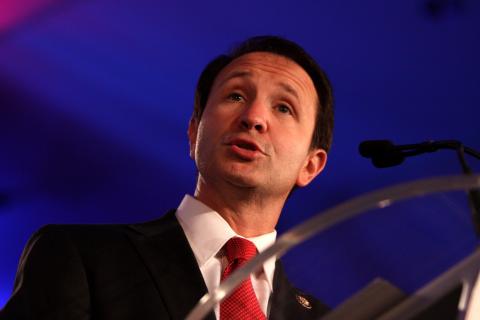Photo Credit: Gage Skidmore / Flickr
Just one week ago, the entire country took notice when Louisiana Gov. Jeff Landry said he wanted to dismantle the state's nonpartisan "jungle primary." In the midst of a special session, the Legislature swiftly moved a bill through both of its chambers that did not give the governor everything he wanted, but still disenfranchises over 800,000 non-major party voters in critical elections.
HB 17 was introduced in the Louisiana House of Representatives on January 15. passed on the chamber's floor two days later, moved to the Senate where an amended version was approved on the floor on January 19, and was returned to the House for legislators to approve the amended version which they did the same day.
ALSO READ: Louisiana Gov. Jeff Landry's Political Advisor Spreads False Narrative on Closed Primaries
The bill affects the voting rights of a third of the state's electorate, and yet no time was allowed for public input or extensive debate. The legislative majority simply moved as quick as they could to give the governor at least some of what he wanted.
Gov. Landy wanted a bill that ended a voting system that gives every voter, regardless of party, an equal vote on election day in all elections with a closed partisan primary system that would give the parties and their leaders more control over electoral outcomes. HB 17 doesn't apply to all elections and will take effect in 2026.
Specifically, the bill enacts closed partisan primaries for congressional and US Senate elections, state supreme court and school board elections, and elections for the state's Public Service Commission.
It is important to note that states with mixed primary systems often confuse voters. California, for instance, uses a nonpartisan top-two system for all elections except for president. The state uses semi-closed presidential primaries, and it has left voters befuddled on why they don't get equal protection and say in all elections.
Similarly, when Louisiana briefly moved to partisan primaries for only congressional and US Senate races in 2008, it only took two election cycles for policymakers to return to the "jungle primary" after constituents expressed outrage and confusion over why they didn't have equal voting rights in all elections.
Louisiana's "jungle primary" allows all voters and qualified candidates to participate on a single ballot at a time when other states would hold their general elections. If a candidate gets over 50% of the vote, they win outright. If no candidate gets a majority, a runoff is held the following month.
Starting in 2026, only members of the Republican and Democratic Parties will have access to the most critical stage of the elections process for some of the biggest elections in Louisiana -- which means in congressional districts that have been drawn to be safe for one party or the other, party leaders will have the most say over electoral outcomes.
